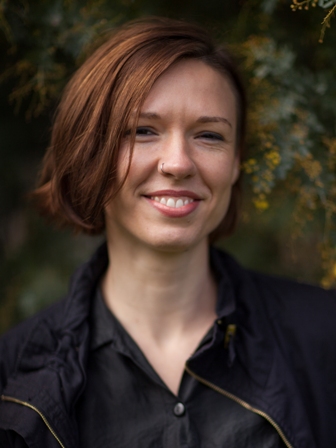meet the judges of the 2016 rachel funari prize for fiction: emily bitto

Over the next few weeks we will introduce you to the wonderful women writers that make up the judging panel of the 2016 Rachel Funari Prize for Fiction.
Today we chat with Melbourne writer and author of The Stella Prize winning debut novel, The Strays, Emily Bitto.
What are you working on in 2016?
I’m working on my second novel… slowly! I’m also running the bar I co-own with my partner and two others (Heartattack and Vine, in Carlton), which is why I’m writing so slowly.
What does “other” mean to you?
That’s a very difficult question to answer in a relatively short number of words, especially for a gal with an Arts degree! I suppose I understand the idea of the “other” as something that doesn’t actually mean anything in and of itself; it’s a category created by, and entirely defined by its opposition to, the dominant group. It is generally a term that implies a position of marginalisation, disempowerment, and misrepresentation, even oppression. Yet, simultaneously, operating from a position of “otherness” can also offer its own potential for a perspective that the dominant group cannot attain – one characterised by genuine radicalism.
As a female writer, are there any experiences from your career journey you’d like to share?
I feel like I’ve been incredibly lucky in terms of the encouragement, support and mentorship I’ve received from other women in the industry, whether they be peers, more established female writers, or editors, agents etc. I’ve also encountered women who have been unsupportive and discouraging, and as a feminist that is always really disappointing to me. I think it’s hard enough for women to be taken seriously as writers, and not to offer one another as much support as possible just seems idiotic to me. I like to operate according to the advice a more established muso apparently gave to a young Bob Dylan: ‘No fear, no jealousy, no meanness’. There is room enough for everyone, but women need to help each other up if we are ever going to reach the top! Fortunately, my overwhelming experience has been of incredible supportiveness among women in the industry, and I hope to be able to contribute to that myself.
The Rachel Funari Prize for Fiction calls for a focus on women’s stories. What’s your view on the current state of women’s stories in media and publishing?
I think, sadly, that women are still far too often represented in relation to the dreaded twin poles of “damned whores” and “god’s police.” A complex, ambiguous, or intellectually-sophisticated interiority is often denied to women in literature, which is utterly false, and very dangerous.
What are you reading right now?
Actually, following on from my previous answer nicely, I’m currently reading Doris Lessing’s The Golden Notebook for the first time. It is an absolutely incredible book that does exactly what I’ve just been lamenting isn’t being done enough: it places a female perspective, and a highly complex and intelligent female interiority, front and centre. It is a bit dated in some ways (it was first published in 1962), but it’s just so great to read an unadulterated, sustained rendering of female interiority in a novel!
What’s on your To Be Read pile?
So many things!! These are only a few: Lauren Groff’s Fates and Furies, which I’ve heard good things about; H is for Hawk, by Helen Macdonald; Hope Farm by Peggy Frew; 10:04 by Ben Lerner; Stoner by John Williams; Tree of Smoke by Denis Johnson, which I’ve been wanting to read for ages. And I’m holding off, against all, logic, from starting the Elena Ferrante series, because I know once I start I’ll have to read them all.
What do you read to feel inspired?
William Faulkner!
Is there a writer or book that has influenced your work?
Probably Michael Ondaatje’s In the Skin of a Lion has had the biggest influence on me. I love everything about that book, and I’ve read it over and over again since I first encountered it in first-year uni. I can still pick it up, flick through to a random page, and find something – a line, an image, an observation or snippet of dialogue – that shocks me with how good it is!
What makes a good short story?
Ooh, that’s another difficult one! I personally think short fiction is the hardest form to master. It’s all about gesturing to all the stuff you don’t have space to include, i.e. the whole world. It’s all about refinement of language and ideas, symbolism, imagery, detail, compression and subtext. And yet it still has to hook the reader and emotionally involve them in the same way a novel does, but in a much shorter time.
Why have you agreed to get involved with the judging of the 2016 Rachel Funari Prize for Fiction?
I like the idea behind the prize: the emphasis on women’s stories but the inclusiveness that allows anyone to attempt to tell them.
What will you be looking for when judging the competition?
I’ll be looking for evidence of careful crafting and consideration of every aspect of fiction, including the ones I mentioned above – symbolism, detail, subtext, emotional resonance etc. I’ll be looking for a story that’s been carefully worked on, rather than something that reads like a first draft, even if the story or idea itself is great. Of course, the story is important too, but great stories are everywhere you look, and it’s the writer’s job to tell them better than your hairdresser ever could! Compexity! That seems to be my favourite word, and that’s what I’m looking for here.
Click here more information on the 2016 Rachel Funari Prize for Fiction.

